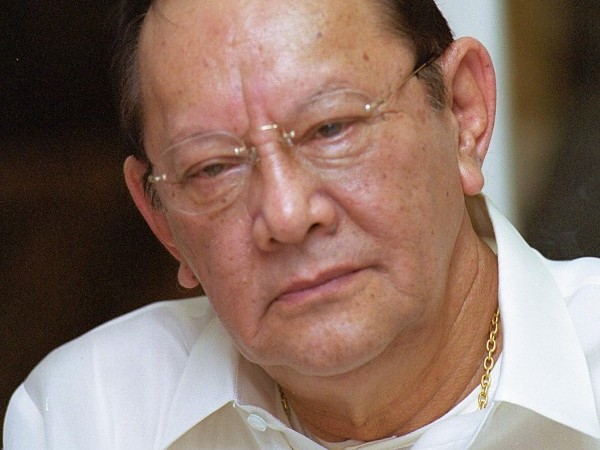The Sandiganbayan has denied the motion for partial judgment filed by the Office of Solicitor General (OSG) in connection with the coco levy case against businessman Eduardo “Danding” Cojuangco, Jr. over his alleged ill-gotten wealth.
While the court thumbed down rendering a partial judgement on the case, it noted that Cojuangco’s positions as owner of the corporation which implemented the said funds, and as President of the bank which administered the contract, are not proof that he “plundered” the coco levy funds.
The civil case, one of eight filed by the government against the dictator Ferdinand Marcos and his cronies, stemmed from allegations that the coco levy funds intended to benefit poor farmers were instead used to benefit Marcos’ alleged cronies.
Former President Marcos taxed coconut farmers promising them that the coco levy would be pooled as a fund intended to develop the coconut industry.
Cojuangco, an alleged Marcos crony, was accused of benefiting from the said fund when these were used to finance projects implemented by his corporation, but the fund allegedly ended up as part of his massive wealth.
“Considering that… the defendants have contested the allegations in the subdivided complaint, all questioning the legality of their acquisition of their property and assets, and alleging that such acquisition was a result of collaboration, with or through the use of relatives, business associates, nominees, agents, and dummies, it is evident that trial has still to be conducted to determine if their property and other assets have been unlawfully acquired… There being still no proof of such illegal or unlawful acquisition, summary judgement… is premature,” the antigraft court Second Division said in a 44-page resolution promulgated Sept. 10 but released to the media Thursday.
Also named respondents in the civil case are Marcos, his wife former First Lady and current Ilocos Norte Rep. Imelda Marcos, former Defense Minister and incumbent Senator Juan Ponce Enrile, the late former Zamboanga Mayor Maria Clara Lobregat (then chairperson of the Coconut Industry Development Fund Management Committee), among others. This is one of eight subdivided coco levy fund cases before the Sandiganbayan.
Coco levy fund
The government wants the court to resolve whether or not to declare as null and void the series of memorandum of agreement (MOA) between Cojuangco’s Agricultural Investors Inc. (AII) and the National Industry Development Corp. (NIDC), a subsidiary of the Philippine National Bank.
The MOA was signed for the establishment of a hybrid coconut seed nut farm sourced from the coco levy fund, also known as Coconut Industry Development Fund. Marcos tasked the NIDC to administer the said funds.
Marcos later issued an executive order transferring the coco levy funds interest-free to the United Coconut Planters Bank (UCPB), where Cojuangco was president and board director. Marcos also issued a presidential decree which tasked the UCPB to administer the contract between NIDC and AII.
The government wants the court to declare as null and void the MOAs due to alleged corrupt practices and compel Cojuangco and other respondents to return to government P958.8 million, which represented the sums of money awarded to Cojuangco’s AII.
The OSG said the agreements were executed even though it is grossly disadvantageous to government. The contracts allegedly were favorable to AII because it allowed Cojuangco’s firm to increase the price of the coconut seed nuts.
The OSG said Cojuangco’s company AII were granted favorable terms and several price increases at a time he was also president and director of the UCPB, which administered the contract.
But the court said a contract can only be nullified for being grossly disadvantageous to government if it constitutes a “corrupt practice” under the Anti-Graft and Corrupt Practices Act.
The court said it does not agree that Cojuangco’s alleged “conflict of interest” makes the contracts a result of a “corrupt practice.”
“The seeming conflict of interest… arising from the positions held by Cojuangco Jr. would not be sufficient to declare that the contracts constitute a ‘corrupt practice’… The fact alone that defendant Cojuangco Jr. held positions in all AII and UCPB at the time material to this case is not sufficient to show that the MOA and its amendments and supplements constituted a ‘corrupt practice,’” the court said.
“Strictly speaking, the positions of Cojuangco, though established by the facts, is not evidence in itself that he has plundered the coconut levy funds…” it added.
In denying the partial judgement, the court said there remain thorny issues behind the information which can only be resolved in a full-blown trial.
Fiduciary obligation
The court was also asked to rule on the liability of Cojuangco and Enrile, who are both UCPB directors at the time, for allegedly violating their fiduciary obligations to the bank.
When Marcos lifted the coco levy in 1982, UCPB terminated the MOA with AII, which compelled the latter to file an arbitration case demanding damages.
The Board of Arbitrators ruled in favor of AII and ordered the payment of P532 million in damages sourced from the coconut levy fund.
The UCPB board, including Cojuangco and Enrile, unanimously allowed the arbitrators’ decision to lapse into finality for the payment of damages to push through, compelling the government to accuse Enrile and Cojuangco of violating the Corporation Code when they allegedly violated their fiduciary obligations to UCPB.
But the court said it is merely “speculation” to say that the UCPB under Cojuangco and Enrile allowed the decision to lapse into finality because the facts do not show gross negligence or bad faith.
“The insinuation of the plaintiff as to the reason why UCPB allegedly allowed the decision to lapse into finality is nothing more but pure speculation and does not convey any badge of bad faith unless proven by concrete evidence,” the court said.
“Based thereon, the Court cannot hold defendants Cojuangco Jr., Enrile, and Lobregat liable and apply to them the penalty provided under Section 31 of the Corporation Code,” it added.
